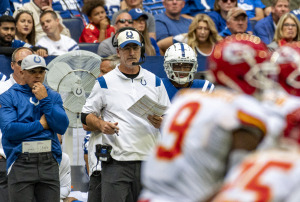
New IU basketball coach DeVries to make $27M-plus over 6 years
Darian DeVries’ annual average salary of $4.5 million would have been fourth among Big Ten Conference basketball coaches last season

Darian DeVries’ annual average salary of $4.5 million would have been fourth among Big Ten Conference basketball coaches last season

At least four states are considering giving college athletes tax breaks on endorsement income.

Coach after coach, from Virginia’s Tony Bennett to Villanova’s Jay Wright, have walked away from college basketball, saying it no longer holds the appeal it once did.

The former Indianapolis Colts quarterback, who was hired as Stanford’s general manager last November, tapped his former head coach to helm the team as it searches for a new head coach.

Butler is one of 16 teams that will play in the new College Basketball Crown tournament, which runs Monday through Sunday in Las Vegas.

Big Ten player of the year Braden Smith added seven points and 15 assists to lead Purdue.

There’s a method to the madness that is the NCAA Division I men’s basketball tournament—and it relies wholly on the collective involvement of thousands of NCAA and university staffers, contractors, local organizers, venue workers and volunteers.

Jeremy Pruitt is suing the Indianapolis-based NCAA for $100 million for lost and future wages.

This year’s NCAA Men’s Basketball Tournament resumes Thursday and Friday with regional play.

In an era of college basketball where the only true constant seems to be change, Painter remains a model of consistency.

The first round of the women’s tourney this year featured a near-record number of blowouts and noncompetitive games.

The Sweet 16, a popular destination for bracket-busting mid-majors, is made up entirely of teams from power conferences, a first since the bracket expanded to 64 teams in 1985.

While game tickets and downtown hotel rooms were already expected to sell out regardless of which teams end up in Indianapolis to play, Purdue’s inclusion is likely to boost visitor traffic throughout downtown.

The player accuses former team physician Dr. Bradford Bomba Sr. of unnecessarily performing a rectal examination on him during a routine physical examination.

The new coach brings 24 years of Division 1 coaching experience to Indiana University, which parted ways at the end of the season with coach Mike Woodson.

The survey found that about one-quarter of Americans fill out a men’s March Madness bracket “every year” or “some years.”

Purdue is in the Midwest Regional of the NCAA men’s basketball tourney, meaning the team will play in Indianapolis if it reaches the Sweet 16. Meanwhile, three schools from Indiana will play in the NCAA women’s basketball tournament.

He will have worked 84 games by the time his broadcasting season ends, which is about 35 more than the industry norm for elite announcers.

When “A Season on the Brink” appeared in 1986, it was immediately recognized as a breakthrough in sports writing.

The new rules will come into play when terms of the landmark $2.8 billion antitrust settlement reconfiguring the industry go into effect this summer.